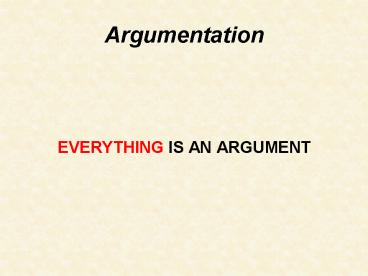Argumentation - PowerPoint PPT Presentation
Title: Argumentation
1
Argumentation
- EVERYTHING IS AN ARGUMENT
2
EVERYTHING!!!!!
3
Letters to the Editor
- Example letter concerning the re-naming of
Highway 290 as Ronald Reagan Highway You are
basically arguing whether this is a good idea.
4
Personal Narrative
- role of childhood friends
- most important relative
- connection to your name
- biggest embarrassment
- greatest loss
- greatest learning experience
5
Applications
- Jobs- High School through Adulthood
- Honor Society
- College Acceptance
6
Expository Essay
- Explain the merits (or ills) of Columbus
- Explain the causes of the Civil War
- Explain the efficacy of dropping the bomb on
Hiroshima - Explain the racial subtexts of The Adventures of
Huckleberry Finn
7
The Rhetorical Triangle
by Aristotle
Speaker
Text
Audience
8
What is rhetoric?
- The art or study of using language effectively
and persuasively. American Heritage College
Dictionary - Rhetoric may be defined as the faculty of
discerning in any given case the available means
of persuasion. Aristotle
9
- Aristotle said that when a rhetor (speaker)
begins to consider how to compose a speech,
he/she must take into account 3 elements the
text, the audience, and the speaker.
Speaker
Audience
Text
10
Audience
- The writer/speaker
- speculates about audience expectations and
knowledge of subject, and - uses own experience and observation to help
decide on how to communicate with audience.
11
Text
- The writer/speaker
- evaluates what the audience knows already and
needs to know, - investigates perspectives (researches), and
- determines kinds of evidence, format, style, etc
that seem most useful (supports assertions with
appropriate evidence).
12
Speaker
- The writer/speaker uses
- who they are,
- what they know and feel, and
- what theyve seen and done
- to find their attitudes toward a text and their
understanding of audience.
13
Appeals
- The writer/speaker uses different approaches to
influence the audiences attitude toward the
subject. These are - Logos
- Ethos
- Pathos
14
Logos
- The writer/speaker
- offers clear, reasonable premises and proofs,
- develops ideas with appropriate details, and
- makes sure readers can follow the progression of
ideas.
15
Ethos
- The writer/speaker uses it when
- he/she demonstrates that they are credible,
good-willed, knowledgeable and - he/she connects their thinking to the readers
own ethical or moral beliefs. - Audiences and speakers should assume the best
intentions and most thoughtful search for truths.
16
Pathos
- The writer/speaker
- draws on emotions and interests of readers and
- highlights those emotions using
- 1) personal stories and observations
- to provoke audiences sympathetic
- reaction and
- 2) figurative language to heighten
- emotional connections.
17
Ask not what your country can do for you - ask
what you can do for your country. John F.
Kennedy
- calls attention to ethical qualities of the
speaker and listener (ethos) - proposes a solution to the countrys problems by
enlisting the citizens help (logos) - calls forth emotional patriotism (pathos)
18
Context and Purpose (intended effect on
audience)
- Context the situation in which the text
- occurs
- Purpose the emerging aim that
- underlies many of the writers
- decisions
19
Rhetorical Triangle Plus
Speaker
Context/Purpose (intended effect on audience)
Text
Audience
20
- The context (the situation in which the text
occurs) is especially important. - Context may reflect important socioeconomic,
cultural elements, or more mundane things, such
as where and when the text occurs. - Some like to think of context as setting.
- Man with painting on sidewalk/ or in museum.
- Martin Luther King Jr.s I Have a Dream speech.
21
- Context tends to be more important when you are
reading a text. You need to be aware of the
situation in which the text was created. - When you are composing, the context is usually
less important because you are composing here and
now, and you are aware of the context. - There are always exceptions if you are writing
about moves toward democracy in the Middle East,
but you live in the US, you may need to be aware
of how your context differs from those who live
in the Middle East and that may affect your
argument.
22
- Purpose (aka intent) is a tricky thing.
- I tell a joke you dont laugh. Is it more
important that I want you to laugh or that you
dont laugh? Perhaps my intent to make you laugh
and the fact that you dont laugh are equally
interesting to note, but neither is more
important. - It is my not-so-humble opinion that one of the
problems with education has been a focus on the
importance of what the author meant (intent),
when audience reaction is as important. - So I prefer to refer to purpose as intended
effect on audience.
23
There is purpose!
- This is not to say there is no such thing as
intent or purpose. When you are writing, you must
know your purpose. - In an academic paper the purpose may be presented
in your thesis statement. - And Purpose can be clear when you are reading as
well all ads want you to buy the product.
24
Final thoughts
- Remember that the rhetorical triangle is not a
recipe or a guideline for writing it is a way of
looking at a situation. - Rhetorical situation is a specific (given)
moment in which you ca use the rhetorical
triangle 1 to observe what is happening. - In any situation - by definition, really - all
parts of the triangle are present.































